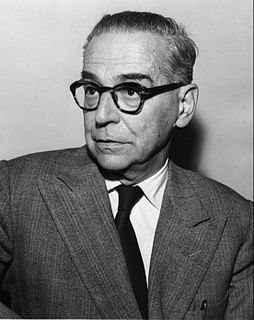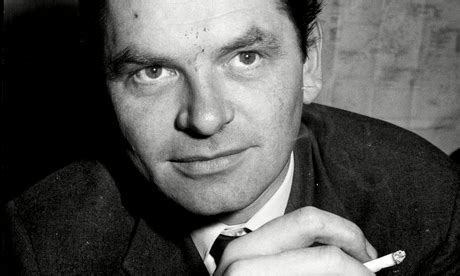A Quote by Ivo Andric
There comes a time when a man finds himself in front of a dark uncrossable abyss, which he himself has spent years digging. He cannot go forward, and has no way back. Words have failed, tears won't help, and who would he call out to? He can't even remember his own name. Then the man sees that on this god's green earth there is but one true suffering: the torment of guilty conscience.
Related Quotes
No man could bring himself to reveal his true character, and, above all, his true limitations as a citizen and a Christian, his true meannesses, his true imbecilities, to his friends, or even to his wife. Honest autobiography is therefore a contradiction in terms: the moment a man considers himself, even in petto, he tries to gild and fresco himself. Thus a man's wife, however realistic her view of him, always flatters him in the end, for the worst she sees in him is appreciably better, by the time she sees it, than what is actually there.
Man is a fallen star till he is right with heaven: he is out of order with himself and all around him till he occupies his true place in relation to God. When he serves God, he has reached that point where he doth serve himself best, and enjoys himself most. It is man's honour, it is man's joy, it is man's heaven, to live unto God.
If God wishes to be born as man and to unite mankind in the fellowship of the Holy Ghost, He suffers the terrible torment of having to bear the world in its reality. It is a crux; indeed, He Himself is His own cross. The world is God's suffering, and every individual human being who wishes even to approach his own wholeness knows very well that this means bearing his own cross. But the eternal promise for him who bears his own cross is the Paraclete.
The feeling of patriotism - It is an immoral feeling because, instead of confessing himself a son of God . . . or even a free man guided by his own reason, each man under the influence of patriotism confesses himself the son of his fatherland and the slave of his government, and commits actions contrary to his reason and conscience.
Take a young man from Gaza living in the most horrendous conditions - most of it imposed by Israel - who straps dynamite around himself and then throws himself into a crowd of Israelis. I've never condoned or agreed with it, but at least it is understandable as the desperate wish of a human being who feels himself being crowded out of life and all of his surroundings, who sees his fellow citizens, other Palestinians, his parents, sisters, and brothers, suffering, being injured, or being killed. He wants to do something, to strike back.
And he began to see the truth, that Ged had neither lost nor won but, naming the shadow of his death with his own name, had made himself whole: a man who, knowing his whole true self, cannot be used or possessed by any power other than himself, and whose life therefore is lived for life's sake and never in the service of ruin, or pain, or hatred, or the dark.
The foundation of humility is truth. The humble man sees himself as he is. If his depreciation of himself were untrue,... it wouldnot be praiseworthy, and would be a form of hypocrisy, which is one of the evils of Pride. The man who is falsely humble, we know from our own experience, is one who is falsely proud.
Our passions are the chief means of self-preservation; to try to destroy them is therefore as absurd as it is useless; this would be to overcome nature, to reshape God's handiwork. If God bade man annihilate the passions he has given him, God would bid him be and not be; He would contradict himself. He has never given such a foolish commandment, there is nothing like it written on the heart of man, and what God will have a man do, He does not leave to the words of another man. He speaks Himself; His words are written in the secret heart.
There is a note that comes into the human voice by which you may know real weariness. It comes when one has been trying with all his heart and soul to think his way along some difficult road of thought. Of a sudden he finds himself unable to go on. Something within him stops. A tiny explosion takes place. He bursts into words and talks, perhaps foolishly. Little side currents of his nature he didn't know were there run out and get themselves expressed. It is at such times that a man boasts, uses big words, makes a fool of himself in general.
A certain ultra-dignified gentleman of unusual prominence carried himself so stiffly that nobody felt free to call him by his first name. He quarreled with a friend of earlier days and from then on the two never spoke. The day the friend died an associate found the ultra-dignified gentleman staring through the window. When he came out of his reverie, he soliloquized with a sigh, ""He was the last to call me John."" Is any man really entitled to regard himself a success who has failed to inspire at least a goodly number of fellow mortals to greet him by his first name?







































